【教学设计】高中英语高二必修四《Workingtheland》精品教案
必修4 Unit 2 Working the land教学设计

必修4 Unit 2 Working the land教学设计必修4 Unit 2 Working the land一、课标内容二、教学要求(Teaching demands)三、教学建议(Suggested teaching notes)1、课时分配2、教材各部分教学建议本单元的中心话题是“农业”。
“热身”(Warming Up)部分围绕有关农业、农村和农作物种植的内容提问,让学生谈谈对农村和农业劳动的认识或经验。
采用讨论法,在讨论中,教师可充分调动来自农村的学生的讨论积极性,并给予学生一个互相学习和交流的机会。
对于没有这方面知识和体验的学生,教师应鼓励他们利用这一机会进行社会调查,有条件的最好能到农村体验生活,让学生有机会真正了解农村生活,了解中国农民的生活现状,提高他们对农业的认识,使来自城镇的现代农业知识的中学生对农村和农业有一定感性认识。
“读前”(Pre-reading)部分提了两组问题。
第一组问题讨论大米在东亚和东南亚国家的人民基本生活中所处的地位;第二组问题提出了世界上迫切要解决的现象即饥饿。
有关讨论不仅力图激发学生的创造性思维,帮助对课文的理解,为阅读部分的教学做好铺垫。
同时让学生了解世界上还存在极其严重的饥饿问题,培养了学生的同情心和人道主义精神。
“阅读”(Reading)部分介绍中国著名的农业科学家、“水稻之父”袁隆平和他的巨大成就。
第一段通过对袁隆平的外貌描写,刻画出一个普通中国农民的形象。
袁隆平也称他自己是农民,也和农民一起耕种,他的科研殿堂就是广阔的农村。
然后介绍袁隆平的科研成果—超级杂交水稻。
第二段介绍袁隆平的家庭背景、学业和科研情况。
第三段勾勒出袁博士不图名不图利,无私奉献的高尚品质。
教学中我们可以引导学生从不同角度分析袁隆平的工作、成就、生活及人格魅力等,勾画出一个过着普通人的生活,干着伟大的事业人先进人物;塑造了一个朴实、务实的中国农业科学家的形象。
“理解”(Comprehending)部分设计了三个练习。
人教版高中英语必修4《Unit 2 Working the land》教案2篇
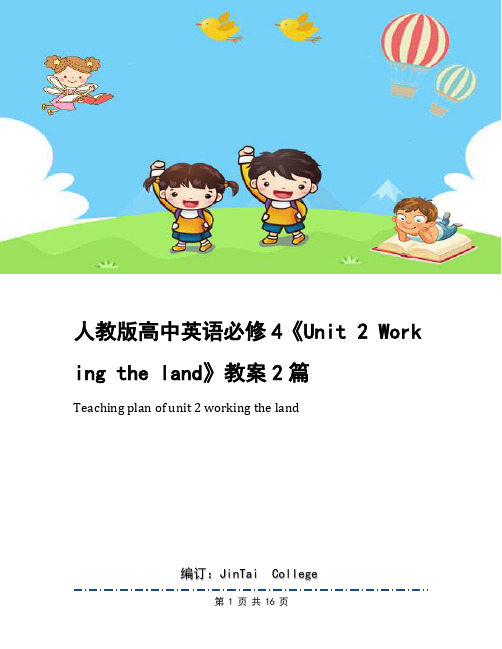
人教版高中英语必修4《Unit 2 Work ing the land》教案2篇Teaching plan of unit 2 working the land编订:JinTai College人教版高中英语必修4《Unit 2 Working the land》教案2篇前言:英语作为在许多国际组织或者会议上都是必需语言,几乎所有学校选择英语作为其主要或唯一的外语必修课。
英语教学涉及多种专业理论知识,包括语言学、第二语言习得、词汇学、句法学、文体学、语料库理论、认知心理学等内容。
本教案根据英语课程标准的要求和教学对象的特点,将教学诸要素有序安排,确定合适的教学方案的设想和计划、并以启迪发展学生智力为根本目的。
便于学习和使用,本文档下载后内容可按需编辑修改及打印。
本文简要目录如下:【下载该文档后使用Word打开,按住键盘Ctrl键且鼠标单击目录内容即可跳转到对应篇章】1、篇章1:人教版高中英语必修4《Unit 2 Working the land》教案2、篇章2:人教版高中英语必修4《Unit 2 Working the land》教案篇章1:人教版高中英语必修4《Unit 2 Working the land》教案教学准备教学目标(1)知识目标:让学生通过阅读课文更多地了解我国著名的农业科学家袁隆平的科研成果及其影响。
(2)能力目标:让学生进一步使用恰当地阅读方式与技能,如略读(skimming),快速阅读(fast reading),细读(close reading)等(3)情感目标:让学生不但学习袁隆平的科研精神,更要学习他不计较名利,踏踏实实的生活态度。
教学重难点1.阅读课文更多地了解我国著名的农业科学家袁隆平的科研成果及其影响。
教学过程1.话题的引导。
(Pre-reading)1).开头通过设计了一首熟悉的诗歌,让学生知道话题---farming.2).涉及到提高产量从而解决世界饥荒问题,从而引出本节课的中心话题--伟大人物袁隆平。
新人教必修4Unit2Workingtheland全套教案

新人教必修4教案 Unit2 Working the land[全套教案]Unit 2 Working the landTeaching aims:1. Target Languagea.Words and phrasessunburn, struggle, super, expand, circulate, equip, export, rid ... of, be satisfied with, lead a ... life, search for, would rather, thanks to, with the hope of, rather thanb. Important sentencesThis special strain of rice makes it possible to produce one-third more of the crop in the same fields. P10He cares little about spending the money on himself or leading a comfortable life. P10 2. Ability goalsEnable Ss to learn more about agriculture, countryside and farming. By talking they can exchange their experience with each other. By reading they will realize the role that agriculture plays in human life. In fact this world faces a serious problem—starvation. So after reading the passage about Dr Yuan students will know the importance of his achievement to man. Of course they will learn from Dr Yuan some noble character.3. Learning ability goalsHelp Ss learn how to describe Dr Yuan Longping including his personality.Teaching important pointsa. Help to comprehend the text and grasp the main idea of the text.b. Grasp the usage of some words and expressions.c. How to help students make up their minds to make contributions to motherland in the future like Dr Yuan.Teaching difficult pointsa. How to help students learn more about agriculture.b. Help students really master the usage of words and expressions.Teaching methodsTalking, questioning-and-answering activity and reading.Teaching aidsA tape recorder, a projector and a computer.Teaching procedures & waysThe first period ReadingStep 1.Greeting and Revision1. Greet the students as normal.2. Revise the warming up with the following questionHow do you think to grow our main food--rice?-----1)First, the farmers plow the field. They have to make the soil loose enough to plant crops.2)Second,grow some young plants3)Third, they insert the young plants into the loose field.4)At last ,they will get the harvestStep 2 Pre-reading1 Ask the following questions1).What’s the main food in Canada and USA:----- potatoes and bread2).What is the main food in South America:----- corn/maize3 )What is the main food in Southeast Asian countries:----- rice2 Show the students some pictures and ask the questionWhat is happening to these people in East Asian and Southeast Asian countries?Then show more news like that:International Facts on Hunger and Poverty (2002)1)Every 8 seconds, a child somewhere in the world dies from starvation.2)More than 800 million people in the world suffer from malnutrition (营养不良)---799 million of them are from the developing world. More than 153 million of them are underthe age of 5.At last ask the students to discuss:If you had the chance to do something to help end hunger in the world, what would you do?Encourage the students to tell their opinions, Then give a conclusion:The only way to solve the food shortage problem is to increase the output of the grain crop per land area through the advancement of science and technology.3. lead the students to pay attention to the people---Yuan LongpingAsk : What do you know about him?--------Father of Hybrid RiceThen lead to the topic of the reading passage. A Pioneer For All PeopleStep 3 ListeningListen to the tape, try to find out some information of the hero.Name ____________Age ____________Job _____________Education _________Achievement _______Hobbies __________Step 4 Fast readingRead the passage quickly and answer the true-or- false questions• 1.Dr Yuan is more a farmer than a scientist.•2. Dr Yuan’s kind of rice is the most suitable for China’s farmland.• 3.Dr Yuan would rather work than relax.• 4. Dr Yuan has dreams when he is asleep and also when he is awake.• 5. Dr Yuan enjoys a simple life than most rich and famous people.Step 5 Careful readingRead each paragraph and answer the following questions:Para 1:1.What dose Dr. Yuan look like? Why?2.What is his achievement?Para 2:1. Why did Dr. Yuan want to increase the rice output when he was young?2.How does he help rid the world of hunger?Para 3.41. What kind of life is Dr. Yuan leading?2.What is Dr Yuan’s dream?Step 6 Skimming:find out the main idea of each paragraph.Paragraph------Main Idea1----------His appearance and achievements2----------His birth, education and research3----------His personality4----------His dreamStep 7 Homework1.Learn the poemThe Peasants’ LotLi Shen (772-846)Farmers weeding at noon,Sweat down the field soon.Who knows food on a tray,Due to their toiling day?2. Finish the exercises in Learning about Language.3. Retell the text in about 150 words.Notes:a. Use the first person to retell the story.b. Try to use the proper conjunctions.The second period Learning about Language(The –ing form as the Subject & Object)AimsTo help students learn about The –ing form as the Subject & Object.To help students discover and learn to use some useful words and expressions.To help students discover and learn to use some useful structures.ProceduresI. Warming upWarming up reading aloud the text A PIONEER FOR ALL PEOPLELanguage is learned in context. So let’s first review the text learned yesterday by reading it aloud. Try to force out your English slowly and clearly.II. Discovering useful words and expressionsIn pairs do the exercises 1, 2 and 3 on pages 11 and 12. You must finish them in 5 minutes.III. Learning about grammar1. Read and identifyRead the text about Yuan Longping again, paying attention to the sentences which use the –ing form as the subject and object.In the sentence “Wishing for things, however, cost nothing. “the –ing is used as subject. It can be also used as object of the sentence. For example: Yuan Longping likes playing his violin.2. Consolidating by do exercisesTo consolidate your understanding you will be given 10 minutes to go over exercises 1,2,3,4 and 5 on pages 12 and 13. You may just write on your text book. I mean the student’s book you are working by.III. Ready used materials for The –ing form as the Subject & Object)语法学习——动名词1. 动名词作主语1)名词直接放在句首作主语。
人教英语必修四Unit2Workingtheland教案4
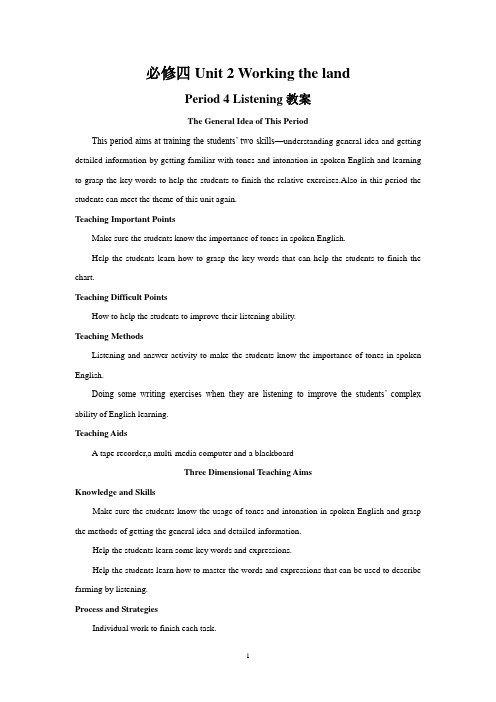
必修四Unit 2 Working the landPeriod 4 Listening教案The General Idea of This PeriodThis period aims at training the students’ two skills—understanding general idea and getting detailed information by getting familiar with tones and intonation in spoken English and learning to grasp the key words to help the students to finish the relative exercises.Also in this period the students can meet the theme of this unit again.Teaching Important PointsMake sure the students know the importance of tones in spoken English.Help the students learn how to grasp the key words that can help the students to finish the chart.Teaching Difficult PointsHow to help the students to improve their listening ability.Teaching MethodsListening-and-answer activity to make the students know the importance of tones in spoken English.Doing some writing exercises when they are listening to improve the students’ complexability of English learning.Teaching AidsA tape recorder,a multi-media computer and a blackboardThree Dimensional Teaching AimsKnowledge and SkillsMake sure the students know the usage of tones and intonation in spoken English and graspthe methods of getting the general idea and detailed information.Help the students learn some key words and expressions.Help the students learn how to master the words and expressions that can be used to describefarming by listening.Process and StrategiesIndividual work to finish each task.The teacher may play the tape a few more times to make the students hear clearly.Feelings and ValueThe students will know more about how to describe farming by listening to the dialogue.Teaching ProceduresStep 1 Revision1.Greetings.2.T:Last class we learnt something about organic farming,now I want to ask some of you to tell me the advantages of organic farming and the disadvantages of chemical fertilizer.(Revise the main content of last class.)Step 2 Listening on Page 14Pre-listeningThe purpose of this story is to illustrate the practical benefits of organic farming methods.It shows the good consequence of using natural fertilizers.ListeningTask 1:Ss listen to the tape and fill the chart.( play the tape for three times )The teacher asks some students to give their answers,and give the right answers.Suggested answers:1.carrots;cucumbers;pumpkins2.carrots;cucumbers;pumpkins3.chemical4.natural5.water6.water7.empty inside8.solid and healthy insideStep 3 Listening on Page 48The purpose of the listening passage is for the students to realize that deserts are not inevitable.They have come about through neglect over a long period of time.Ss give their ideas about deserts before listening.Task 1:The students listen to the tape twice and finish Wb Ex.1 and 2 on Page 48,then check theanswers.Suggested answers:Ex.1:Fertile farmland (1)Land becomes dry (3)Soil is blown away (5)Not enough water (2)Plants die (4)Soil turns to sand (6)Ex.2:1.A;C 2.D3.CTask 2:Ss listen to the tape for the third time and discuss in pairs:What advantages do you think there are in turning desert back into farmland?Ask some students to give their own answers,then show the students the suggested answer:I think the advantages are:firstly,there is more land that can be used to grow food;secondly,the desert can be stopped from expanding.Step 4 Homework1.Finish the listening exercised on the English weekly.2.Prapere for the next class.The Design of the Writing on the BlackboardUnit 2Working the landPeriod 4Listening1.nutrition n.营养;滋养;食物2.Listening skill:When you listen to the tape,you should write down some key information about the exercises.Record after TeachingActivities and ResearchTo fully understand the advantages of organic farming,the students may be asked to carry out a research into the benefits of organic farming.Reference for TeachingLearning Tips听力的解题技巧解题时间紧、任务重、难度大,这就要求学生不仅有扎实的听力基础,较强的听力能力,丰富的语言知识,还要具有敏捷的反应速度和正确的解题方法、解题对策、应试技巧,以巧取胜。
必修四 unit2 Working the land教学22
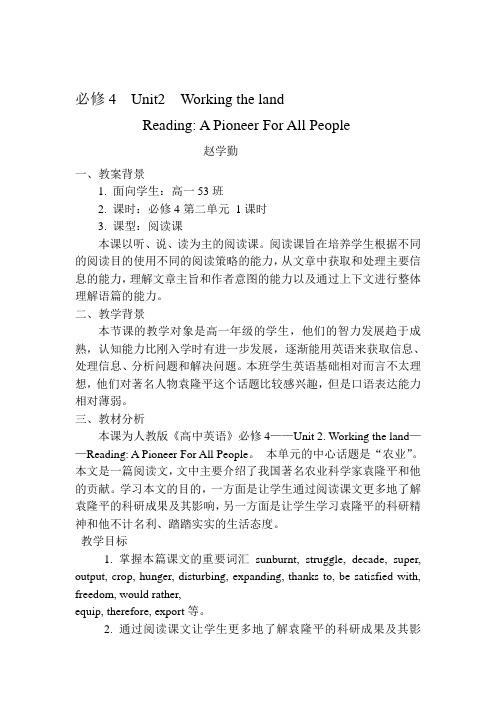
必修4 Unit2 Working the landReading: A Pioneer For All People赵学勤一、教案背景1. 面向学生:高一53班2. 课时:必修4第二单元1课时3. 课型:阅读课本课以听、说、读为主的阅读课。
阅读课旨在培养学生根据不同的阅读目的使用不同的阅读策略的能力,从文章中获取和处理主要信息的能力,理解文章主旨和作者意图的能力以及通过上下文进行整体理解语篇的能力。
二、教学背景本节课的教学对象是高一年级的学生,他们的智力发展趋于成熟,认知能力比刚入学时有进一步发展,逐渐能用英语来获取信息、处理信息、分析问题和解决问题。
本班学生英语基础相对而言不太理想,他们对著名人物袁隆平这个话题比较感兴趣,但是口语表达能力相对薄弱。
三、教材分析本课为人教版《高中英语》必修4——Unit 2. Working the land——Reading: A Pioneer For All People。
本单元的中心话题是“农业”。
本文是一篇阅读文,文中主要介绍了我国著名农业科学家袁隆平和他的贡献。
学习本文的目的,一方面是让学生通过阅读课文更多地了解袁隆平的科研成果及其影响,另一方面是让学生学习袁隆平的科研精神和他不计名利、踏踏实实的生活态度。
教学目标1. 掌握本篇课文的重要词汇sunburnt, struggle, decade, super, output, crop, hunger, disturbing, expanding, thanks to, be satisfied with, freedom, would rather,equip, therefore, export等。
2. 通过阅读课文让学生更多地了解袁隆平的科研成果及其影响。
3. 使学生能够合作完成此课任务。
教学难点1. 如何使学生进行英语表达提高语言交际的能力2. 如何能使学生积极地参与小组讨论有效完成教学任务3. 如何引导学生在段落篇章阅读中运用scanning, skimming, careful reading等不同等阅读技巧。
【必修四英语】《Unit 2 Working the land》优质课教案
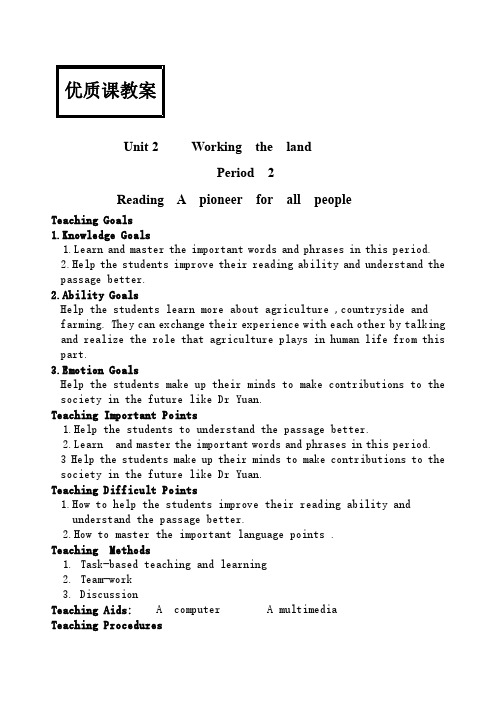
优质课教案Unit2Working the landPeriod2Reading A pioneer for all peopleTeaching Goals1.Knowledge Goals1.Learn and master the important words and phrases in this period.2.Help the students improve their reading ability and understand the passage better.2.Ability GoalsHelp the students learn more about agriculture,countryside and farming.They can exchange their experience with each other by talking and realize the role that agriculture plays in human life from this part.3.Emotion GoalsHelp the students make up their minds to make contributions to the society in the future like Dr Yuan.Teaching Important Points1.Help the students to understand the passage better.2.Learn and master the important words and phrases in this period.3Help the students make up their minds to make contributions to the society in the future like Dr Yuan.Teaching Difficult Points1.How to help the students improve their reading ability andunderstand the passage better.2.How to master the important language points.Teaching Methods1.Task-based teaching and learning2.Team-work3.DiscussionTeaching Aids:A computer A multimediaTeaching ProceduresStep1.ListeningTask1Listen to the text and then match the following ideas with the right paragraphs.Para.1 A.Dr Yuan’s dreams.Para.2 B.Dr Yuan’s personalityPara.3 C.Dr.Yuan’s appearance and his achievements.Para.4 D.Dr.Yuan’s brief life experience.Step2.SkimmingRead the passage quickly and find more information about thetext.Then answer the following questions.Task2Choose the best answers according to the text1.What’s the main meaning about the text?A.a modern famer named Yuan Longping.B.how Yuan Longping became rich and famous.C.a new strain of rice which is called super hybrid rice.D.an agricultural pioneer working hard to produce a super hybrid rice2.What has he been doing for so many years?A.He has been working in the rice field like other farmers.B.He has been doing research to raise the output of rice.C.He has been managing a large farm.D.He has been carrying out experiments in his lab.Step3.Careful reading Read the text carefully and complete the following tasksTask3T or F1.Dr Yuan is more a farmer than a scientist.()2.Dr Yuan’s rice is one of the most suitable ways for China’sfarmland.()3.Dr Yuan would rather work than relax.()4.Dr Yuan has dreams when he is asleep and also when he is awake.()5.Dr Yuan enjoys a simpler life than most rich and famous people.() Task4Para1Answer the following questionsQ1:What does Dr Yuan look like?Q2:What is his achievement?Task5Para2Put Dr Yuan’s biography in right order.a.He was born into a poor farmer’s family.b.He graduated from Southwest Agriculture college.c.In1950,Chinese farmers produced5.5billion tons of rice.d.20billon tons of rice was produced by growing his hybrid rice.e.He searched a way to increase rice outputs without expanding the area of fields.f.He helps rid the world of hunger by circulating his knowledge in lessdeveloped countries.Proper order:Task6Para3Which of the following description about Dr Yuan’s personality is not true?A.He is satisfied with his life because he is now rich and famous.B.He cares little about money and fame.C.He would rather work than lead a comfortable life.D.He enjoys a simpler life than most rich and famous people.Task7Para4What are Dr Yuan Longping’s two dreams?Step4Discussion and speakingTask8Discuss the following two questions in groups and then share your answer with the classQ1.If you had the chance to do one thing to help end hunger in the world, what would you do?Why?Q2.What should we learn from Dr Yuan Longping after learning the text? Step5Homework1.Writing practiceWrite a short biography about Dr Yuan(130words,a writing plan is required.)2.Prepare for the language points.Step6The Design of the Writing on the Blackboard.Unit2Working the landReading A pioneer for all peopleWords and phrases:Answers:教学反思:。
人教课标必修4 Unit2 Working the land 教案
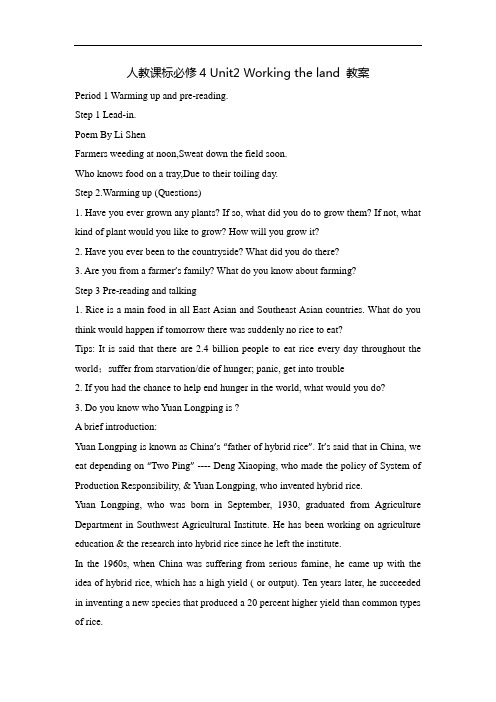
人教课标必修4 Unit2 Working the land 教案Period 1 Warming up and pre-reading.Step 1 Lead-in.Poem By Li ShenFarmers weeding at noon,Sweat down the field soon.Who knows food on a tray,Due to their toiling day.Step 2.Warming up (Questions)1. Have you ever grown any plants? If so, what did you do to grow them? If not, what kind of plant would you like to grow? How will you grow it?2. Have you ever been to the countryside? What did you do there?3. Are you from a farmer’s family? What do you know about farming?Step 3 Pre-reading and talking1. Rice is a main food in all East Asian and Southeast Asian countries. What do you think would happen if tomorrow there was suddenly no rice to eat?Tips: It is said that there are 2.4 billion people to eat rice every day throughout the world;suffer from starvation/die of hunger; panic, get into trouble2. If you had the chance to help end hunger in the world, what would you do?3. Do you know who Yuan Longping is ?A brief introduction:Yuan Longping is known as China’s “father of hybrid rice”. It’s said that in China, we eat depending on “Two Ping” ---- Deng Xiaoping, who made the policy of System of Production Responsibility, & Yuan Longping, who invented hybrid rice.Yuan Longping, who was born in September, 1930, graduated from Agriculture Department in Southwest Agricultural Institute. He has been working on agriculture education & the research into hybrid rice since he left the institute.In the 1960s, when China was suffering from serious famine, he came up with the idea of hybrid rice, which has a high yield ( or output). Ten years later, he succeeded in inventing a new species that produced a 20 percent higher yield than common types of rice.Yuan devoted himself to the research into agriculture, & was honored by UNESCO & FAO(联合国教科文组织). Although he is 74 years old, he is still working on the research into agriculture.Period 2 ReadingStep 1 Lead-in。
人教版高中英语必修4Unit2_Working_the_land教案

Unit2 Working the land单元总体教案1.重点难点1. In many ways, he is one of them, and he struggled for the past five decades to help them.In a way; in one way; in some ways 在某种程度上2.However, he cares little about spending the money on himself or leading a comfortable life.care v. 在乎,在意,喜欢,有兴趣spend sth. … on … 在某方面花费spend … (in) doing sth. 花费…做某事3.Wishing for nothing, however, costs nothing.wishing for nothing 动名词短语做主语,谓语动词用单数。
however是插入语,表示语气的一种转折。
4.It also refers to crops growing with natural rather than chemical fertilizers.refer to 与…有关,关系到某人、某事;提到,涉及;参考5.Instead, organic farmers insist on changing crops every two or three years.insist on 坚持要求;insist后面可以跟从句,其中谓语动词常用should + 动词原形构成6.Dr. Yuan awoke from his dream with the hope of producing a kind of rice that could fees more people.with the hope of 带着某种希望7.He used to walk to his fields twice a day, but now he prefers to ride his motorcycle.used to 过去常常(现在已经不是如此)be used to doing 意思是―习惯于‖prefer to do (rather than do) 相比之下更喜欢做某事8.But whatever they grow they make sure that what is left in the ground after harvesting becomes a natural fertilizer for the next year’s crop.whatever引导让步状语从句,表示―无论怎样‖,相当于no matter what.Eg: Whatever you do, don’t give up.2.功能句型建议(Suggestion & advice)I would rather …I don’t like … because …I’d prefer … because …It’s a great pity that …Should we/I …?It’s better to …If I have a choice I’d choose … because … You need to …May I suggest …? Let me suggest … because …Perhaps we should suggest … because … But what/how about …?3. 重点单词及短语单词① hunger n. 饥饿,食欲;v. 渴望得到某事物,某人hunger for/after sth./sb.② struggle vi.Struggle with sb. 与某人争斗,搏斗struggle (against/with sb./sth.)struggle against/with sb./sth. (for sth.) 争斗,拼搏,奋斗,努力③ expand vi. (使某事物)变大,增强,伸展,张开expand on sth. 阐述或详述expansion n. 扩大,扩展,膨胀④ equip vt.equip sb./sth. (with sth.) 配备,装备equipment n. 设备,装备⑤ export vt. 输出;n. 出口业,出口品import vt. 进口⑥ circulate vi. vt. 使某物循环,流通,传播;vt. 发侧知告知某人circulation n. 循环,流传,传播⑦ confuse vt. 把某人弄糊涂,使为难,打乱confusion n. 混乱,混淆⑧ reduce vt. 缩减,减小,降低reduction n. 减少,缩小⑨ supply vt. 供给,供应,满足;n. 供应,供给之物⑩ exchange vt. 交换,交易;n. 交换,更换,互访,交流exhange sth. with sth.exchangeable adj. 可交换的,可退换的,可兑换的短语rid … of清除,摆脱be satisfied with = be contented 感到满足,满意的would rather do sth. 宁可做某事refer to 与…有关,关系到某人,某事,提到,参考search for 寻找,搜寻thanks to 多亏,由于rather than 而不,宁愿…而不分课时教案Period 1 Warming up and Pre-reading.Step 1. Lead-in.Poem By Li ShenFarmers weeding at noon,Sweat down the field soon.Who knows food on a tray,Due to their toiling day.Then let one student recite the poem in Chinese.Step 2. Warming up by questioningHello, everyone. We shall read about man who works the land today. Have you ever grown any plants? If not, what kind of plant would you like to grow? How will you grow it?(For reference: Mr. Li, I worked with my father in the rice field last year. We grow hybrid rice and use animal wastes to make the soil rich.)Has anyone of you ever been to the countryside? What did you do there?(For reference: I went to Chuankou the day before yesterday. It is a small mountain village 75 li north of Beijing. I went there to visit my uncle’s family. I like that small beautiful village very much. )Who are from a farmer’s family? What do you know about farming?Step 3. Pre-reading and talkingQuestioning and answeringRice is main food in South China. What do you think would happen if tomorrow there was suddenly no rice to eat?(For reference: Then the south people would have to change their eating habit. They could turn to potatoes, wheat flour, cow and sheep cheese, cabbage, onions and garlic for food. They are the bases of the traditional food in North China. )If you had the chance to do one thing to help end hunger in the world, what would you do?(For reference: I would try to end hunger by popularizing the advanced farming techniques. Modern techniques could be introduced to increase the rice output, and expand the area of fields.) Giving background information about Professor Yuan LongpingHave you ever heard of a man called Professor Yuan Longping? Would anyone of you tell the class something about him?(For reference: Professor Y uan Longping is a Chinese agricultural scientist. Professor Yuan's breakthrough scientific achievement led to the world's first successful and widely grown hybrid rice varieties, revolutionizing rice cultivation in China and tripling production over a generation. His approach to rice breeding then spread internationally throughout Asia and to Africa and the Americas, providing food for tens of millions and leading to his becoming known as the "Father of Hybrid Rice."Step 4. ReadingReading aloud to the recordingComprehension—understanding what you are reading—is important. To read in thought groups is an easy, yet effective, way of improving reading comprehension. Now turn to page 9 and read aloud to the recording of the text A PIONEER FOR ALL PEOPLE. Pay attention to the thought groups in the sentences while listening and reading aloud.A brief introduction:Yuan Longping is known as China’s ―father of hybrid rice‖. It’s said that in China, we eat depending on ―Two Ping‖ ---- Deng Xiaoping, who made the policy of System of Production Responsibility, & Yuan Longping, who invented hybrid rice.Yuan Longping, who was born in September, 1930, graduated from Agriculture Department in Southwest Agricultural Institute. He has been working on agriculture education & the research into hybrid rice since he left the institute.In the 1960s, when China was suffering from serious famine, he came up with the idea of hybrid rice, which has a high yield ( or output). Ten years later, he succeeded in inventing a new species that produced a 20 percent higher yield than common types of rice.Yuan devoted himself to the research into agriculture, & was honored by UNESCO & FAO(联合国教科文组织). Although he is 74 years old, he is still working on the research into agriculture. Step 5 课后反思:Period 2 ReadingStep 1. Lead-in. Listen to the tape carefully then answer these questions.1)When and who did become the first agricultural pioneer in the world to grow rice that has a high output?2)What did Yuan Longping invent?Step2. Read the passage once again,then find out these sentences true or false.1)Dr Yuan is more a farmer than a scientist.2)Dr Yuan’s kind of rice is the most suitable for China’s farmland.3)Dr Yuan would rather work than relax.4)Dr Yuan has dreams when he is asleep and also when he is awake.5)Dr Yuan enjoys a simpler life than most rich and famous people.Step3. Find out the topic sentences of each paragraphPara. 1: He became the first agricultural pioneer in the world to grow rice that has a high output. Para.2:He has devoted his life to finding ways to grow more and more rice..Para.3:He cares little about spending the money on himself and would rather keep time for his hobbies.Para.4 Dr. Yuan’s dreams.Step4. Write down Y uan Longping’s personal informationIn pairs, read the text, find information to complete the following form.Facts about Yuan Longping Facts abou t Yuan’s super hybridriceage capacityeducation applicationmajor contributionhobby overseasideal futureStep 5 课后反思:Period 3 using languageStep 1. Language points:1. Struggle for…为争取……而斗争Struggle against…为反对……而斗争Struggle wi th… 与……争斗1)The swimmer struggled against the tide.2)We had to struggle with/against all kinds of difficulties.3)The slaves struggled for the freedom2. 使做…成为… make +it +adj./n. +to do好天气使游泳成为可能The fine weather makes it possible( for us )to swim.他将每早跑步做为一个规则He makes it a rule to run every morning.其他可用这种结构的词:feel, find, think, consider…3.搜查,搜索search (sb. / sth.) for …He searched all the rooms for the missing person.They searched the man all over for money.4.由于,多亏thanks to 相当于because of5.是从前两倍那么多twice as large as before相当于once larger than before6.对……感到满意be satisfied with…相当于be pleased withadj. satisfactory/satisfyingn. satisfaction7.在乎,在意care about比较care forMy aunt cared for me when my parents were away last week.Dr Yuan never cares about money and fame.8. Indeed, his sunburn face and arms and his slim, strong body are like those of millions of other Chinese farmers.e.g: The streets in Beijing are wider than those in my hometown.The number of students in our school is larger than that in their school.9. Dr Yuan grows what is called super hybrid rice.e.g: He came to what is called America.10. This special strain of rice makes it possible to produce one -third more of the crop in the same fields.e.g: That made it possible for life to begin to develop.The development of science makes it possible for us to know more about the universe.11. Dr Yuan awoke from his dream with the hope of producing a kind of rice (that could feed more people).e.g: He went to the U.S with the hope of finding a better job there.Step 2. Closing down by having a dictationTo end the period you will take a dictation. It is about Yuan Longping, ―Father of Super hybrid rice‖.Yuan Longping, China's Most Famous "Farmer"Yuan came up with the idea of hybridizing rice for the first time in the world in 1960s. Since then, 50 percent of China's total rice cultivation fields have grown such rice, which added some 300 billion kilograms to the country's grain output. Furrows grown on his sunburnt face, aslim figure and coiled-up trousers legs would confuse foreign reporters who came to interview the most famous scientist in China, who would rather be called ―a farmer‖. Indeed, like many Chinese farmers, Yuan in his 70s and has devoted most of his life growing rice in paddy fields, but unlike those farmers, he reaps the seed from experimental fields only for hybridizing rice.Step 3 课后反思:Period 4 Listening, Speaking and WritingLearning Aims:To help students read the passage Organic Farming.To help students to use the language by reading, listening, speaking and writing.Teaching Procedures:Step 1. Warming up by listening and reading aloudLanguage is created to be listened to and spoken first. So open your book to page 13 and read it aloud while listening to the recording. Watch your pauses between the thought groups.Step 2. Guided reading1. Reading and translatingRead the text sentence by sentence, and put it into Chinese. Who will be the first to try. I will only have four of you to do this task.2. Reading and underliningNext you are to read and underline all the useful expressions or collocations in the passage. Copy them to your notebook after class as homework.Collocations from textgain a meaning, refer to…, make the soil fertile, natural waste from animals, put…in the field, make the soil rich, become healthy, develop a healthy soil, reduce diseases, grow strong and healthy, keep…free from…, leave…in the ground, as a result, get exhausted, kill bacteria and pests, insist on…, change crops, be followed by…, put…back into …, need a deeper level of soil, prefer doing sth., plant…between crops, prevent…from…, carry away…, make sure that3. Doing exercisesNow you are going to do exercises No. 1, 2 and 3 on page 14 following the article.4. ListeningFor listening turn to page 14 and then 15 for the listening exercises 1, 2 and 3. Are you ready? 5. Reading, speaking and writingWhen trying to argue people into or out of doing something we may use the following expressions:I would rather…I don’t like…because…I’d prefer…because It’s a great pity that…Should I / we…?It’s better to…This is good value because…If I have a choice I’d choose…becauseWhat is the advantage of…?You need to…In pairs you are to make up a dialogue to argue each other into or out adopting organic farming. I will argue with your monitor, Liang Bochao. Get started.Step 3. Guided writing1. Writing a posterWriting a poster which includes all the information about the uses of computer so that you will encourage more farmers to buy and use. You are asked to base your poster on the overall pattern of the article you learned Organic Farming. Limit your poster to between 200 and 250 words.2. Writing a speechWrite a speech for Professor Yuan Longping. He is to attend an international conference on modern agriculture. You may also make use of the library and network resources for the task. Step 4. Further applying1. Finding informationRead online to find as much information as possible about Professor Yuan Longping and his research group. Share your findings with you partner next time you are here.2. Writing a reportGo back home to interview your parents or your grandparents about China’s agriculture, its past and present situations. Write a report in English in about 500 words as a weekly project.3. Acting a text playTurn either one of the two articles into a text play. Rehearse it and play it in front of the class. The play shall last at least 10 minutes.Step 5. Closing down1.Closing down by filling a formTo end the period, please fill in the form below.What is organic farming?definitioncharacteristicspotentials2. Closing down by imagingImagine and write about what the agriculture will be like 50 years from now in the future. Use your imagination to compete for ―wild thinking prize‖.Step 6 课后反思:Period 5 Grammar and Useful Structures Learning AimsTo help students learn about The –ing form as the Subject & Object.To help students discover and learn to use some useful words and expressions.To help students discover and learn to use some useful structures.Teaching ProceduresStep 1. Warming upWarming up reading aloud the text A PIONEER FOR ALL PEOPLELanguage is learned in context. So let’s first r eview the text learned yesterday by reading it aloud. Try to force out your English slowly and clearly.Step 2. Discovering useful words and expressionsIn pairs do the exercises 1, 2 and 3 . You must finish them in 5 minutes.Step 3. Learning about grammar1. Read and identifyRead the text about Yuan Longping again, paying attention to the sentences which use the –ing form as the subject and object.In the sentence ―Wishing for things, however, cost nothing. ―the –ing is used as subject.It can be also used as object of the sentence. For example: Yuan Longping likes playing his violin.2. Consolidating by do exercisesTo consolidate your understanding you will be given 10 minutes to go over exercises 1,2,3,4 and 5 on pages 12 and 13. You may just writ e on your text book. I mean the student’s book you are working by.Step 4. Ready used materials for The v–ing form as the Subject & Object)语法学习——动名词1. 动名词作主语1)名词直接放在句首作主语。
人教版高中英语必修4Unit2Workingtheland教学设计
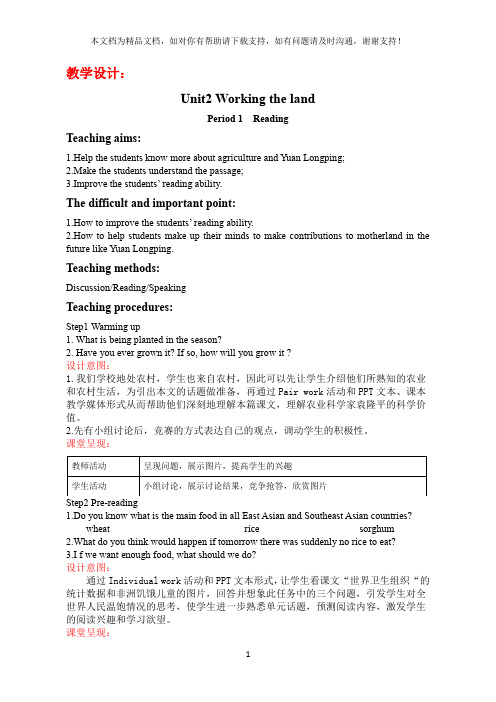
教学设计:Unit2 Working the landPeriod 1 ReadingTeaching aims:1.Help the students know more about agriculture and Yuan Longping;2.Make the students understand the passage;3.Improve the students’ reading ability.The difficult and important point:1.How to improve the students’ reading ability.2.How to help students make up their minds to make contributions to motherland in the future like Yuan Longping.Teaching methods:Discussion/Reading/SpeakingTeaching procedures:Step1 Warming up1. What is being planted in the season?2. Have you ever grown it? If so, how will you grow it ?设计意图:1.我们学校地处农村,学生也来自农村,因此可以先让学生介绍他们所熟知的农业和农村生活,为引出本文的话题做准备,再通过Pair work活动和PPT文本、课本教学媒体形式从而帮助他们深刻地理解本篇课文,理解农业科学家袁隆平的科学价值。
2.先有小组讨论后,竞赛的方式表达自己的观点,调动学生的积极性。
课堂呈现:教师活动呈现问题,展示图片,提高学生的兴趣学生活动小组讨论,展示讨论结果,竞争抢答,欣赏图片Step2 Pre-reading1.Do you know what is the main food in all East Asian and Southeast Asian countries?wheat rice sorghum2.What do you think would happen if tomorrow there was suddenly no rice to eat?3.I f we want enough food, what should we do?设计意图:通过Individual work活动和PPT文本形式,让学生看课文“世界卫生组织“的统计数据和非洲饥饿儿童的图片,回答并想象此任务中的三个问题,引发学生对全世界人民温饱情况的思考,使学生进一步熟悉单元话题,预测阅读内容,激发学生的阅读兴趣和学习欲望。
人教版高中英语必修4《Unit 2 Working the land》教案
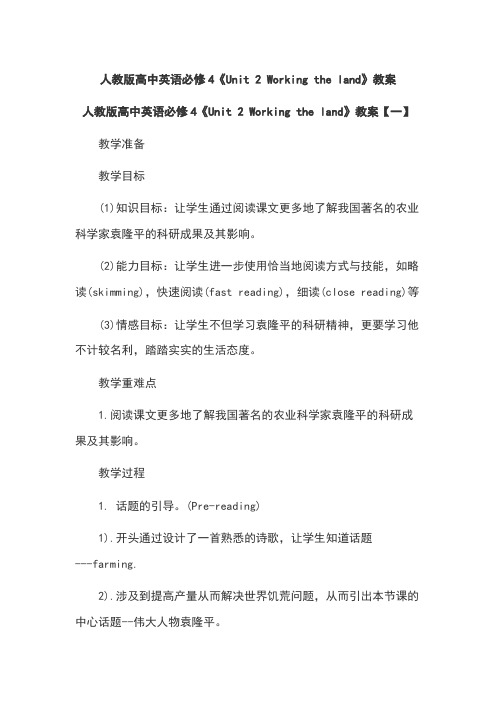
人教版高中英语必修4《Unit 2 Working the land》教案人教版高中英语必修4《Unit 2 Working the land》教案【一】教学准备教学目标(1)知识目标:让学生通过阅读课文更多地了解我国著名的农业科学家袁隆平的科研成果及其影响。
(2)能力目标:让学生进一步使用恰当地阅读方式与技能,如略读(skimming),快速阅读(fast reading),细读(close reading)等(3)情感目标:让学生不但学习袁隆平的科研精神,更要学习他不计较名利,踏踏实实的生活态度。
教学重难点1.阅读课文更多地了解我国著名的农业科学家袁隆平的科研成果及其影响。
教学过程1. 话题的引导。
(Pre-reading)1).开头通过设计了一首熟悉的诗歌,让学生知道话题---farming.2).涉及到提高产量从而解决世界饥荒问题,从而引出本节课的中心话题--伟大人物袁隆平。
2. 跟读与限时阅读完成导学案练习贯彻目的与困难策略,指导学生根据不同的阅读目的,在阅读的不同阶段,灵活使用各种阅读策略,捕捉文章主要信息,理解作者的写作意图,突破本文的教学重点与难点。
采用整体语言教学法和任务型语言教学法。
1)、通过限时阅读训练,引导学生如何利用略读(skimming)的方法把握文章的大意,侧重培养快速阅读理解能力和文章中心把握能力。
2)、精读各个段落语段,侧重培养快速捕捉文章重要细节的能力和猜测生词的能力,学会欣赏文章中的优美句子。
3:阅读过程--浅层次阅读。
(Reading I)1). 其中关于人物的基本信息中,通过设计了一个信息表格的浅层次阅读练习,对文中人物有了初步了解。
2). 关于他的梦想,书本上描写得非常生动,我让班里有艺术特长的学生画了一幅漫画,利用画面反映课文第四段所描述的内容,同时用第一人称配了声音效果。
4. 阅读过程--深层次阅读。
(Reading II)在处理了一些简单信息之后,阅读人物最重要的是要读出人物不同于其他人的成就以及值得学生学习的一些可贵品质。
必修4 Unit 2 Working the land教案
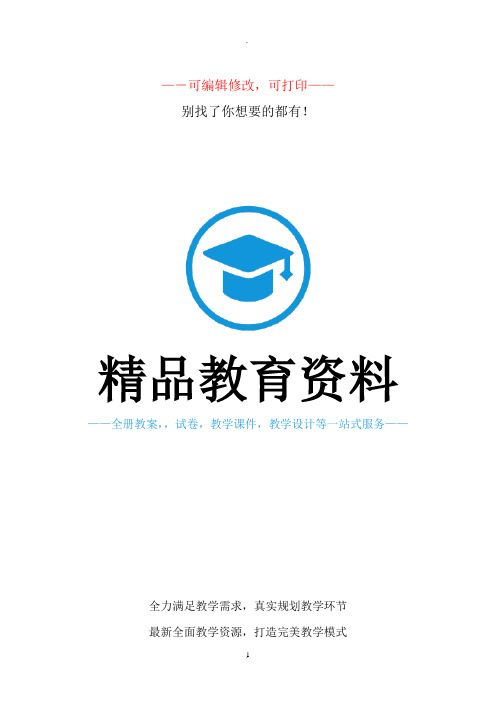
—-可编辑修改,可打印——别找了你想要的都有!精品教育资料——全册教案,,试卷,教学课件,教学设计等一站式服务——全力满足教学需求,真实规划教学环节最新全面教学资源,打造完美教学模式必修4 Unit 2 Working the land林燕玲2014.4.18分课时教案Period 1-2. New words learning & Warming up & Reading一、Teaching aimsKnowledge aims:1. Let the students learn and grasp new words and expressions of unit 5.2. Enable Ss to learn more about agriculture, countryside and farming.3. Enable the students to know the main idea of the passage.Ability aims:Develop the students` reading ability and let them learn to use some reading strategies such as skimming, scanning, and so on.Emotional aims:1. Let the students treasure what we have now, including rice ,friendship and so on.2. Develop the students’ spirit of cooperation and teamwork.二、Teaching important points1. Talk about the procedures of growing rice.2. Discuss the importance of rice.3. Let the students know the main idea of the passage.三、Teaching difficult points1. Understand how to grow rice.2. Discuss the question:What will life be like if we have no food to eat?四、Teaching methods1.Skimming and scanning2.Asking-and-answering activity3.Individual, pair or group work to finish each task.4.Discussion.五、Teaching proceduresStep1. New words learning1.Ask the students to pronoun the new words of this unit and correct some of them.2.The whole class read the new words after the teacher.3.The whole class read the new words together.Step2. Lead-in and W arming Up1. Have you ever been to such a place?What did farmers usually do there?---Farmers grow rice there.2.Do you know how to grow rice?Plow the fields, grow some young plants, insert the young plants into the fields, spray the agricultural chemicals, harvestT: That is how the rice comes from. We have learnt a poem about growing rice. Do you remember?S: Li shen Min NonT: Yes, you get it!Then show them the pictures about the poem:☐Farmers weeding at noon,☐Sweat down the field soon.☐Who knows food on a tray,☐Due to their toiling day.Step3. Pre-reading1.DiscussionGet the Ss to discuss the questions:What do you think would happen if tomorrow there was suddenly no rice to eat?Suggested answer: starve to death.2. Conclusion:Suggested answer:Rice plays an important role in our life. We should treasure it and find more ways to produce more rice.3. Do you know how to solve this problem? And who made a great contribution to solving this problem?Suggested answer: Yuan LongpingStep4. Reading: A pioneer for all people1. SkimmingTask 1: Listen to the tape and try to fill in the following blanks.Name: Yuan LongpingAge:84 ( as of 2014)Nationality:ChineseOccupation:scientist/ farmerEducation:graduated from Southwest Agricultural College in 1953Dream:to export his hybrid rice so that it can be grown around the globeAchievement: in 1973, developed hybrid rice which produces 20% more than normal rice Hobbies: listening to violin music, playing mah-jong, swimming and reading.Task 2: According to the exercise one on Page 11, sum up the main idea of the passage. Summary: Yuan Longping, an ordinary person but a famous scientist, has been working hard to increase rice harvest without expanding the area of the field, helping China as well as the world get rid of hunger.2.ScanningTask 3: Finish the exercises book Page 27 Task2 金版学案学生用书27页1.Why does Yuan Longping work the land?A. Because he was born into a farmer’s family.B.Because he needs to do his research on farming.C.Because he is interested in farming.D.Because he has a slim and strong body.2. According to the text, in 1950, Chinese farmers could produce only ______ tons of rice.A.20B.200C.56D.5003. The following are all Yuan Longping’s hobbies EXCEPT_______.A.Listening to violin musicB.Swimming and readingC.Playing mah-jongD.Smoking and drinking4.How does Yuan Longping’s feel about money?A.Too much money can only bring more troubles than happiness.B.One has to own a large sum of money.C.Money is not important at all.D.One has to spend all his money on his own research.5. The whole passage mainly talks about______.A.how to sovle the world’s hunger problemB.how to increase rice harvests.C.Yuan Longping’s achievements in farmingD.Yuan Longping’s daily lifeSuggested answers: B CDACStep 5. DiscussionWhat advantages and disadvantages do you see in Yuan Longping’s life? Would you like to have a life like his? Why or why not?Step6. Homework1.Copy the new words and learn the new words by heart.2.Learn the useful new words and expressions in this period by heart.Period 3-4 Language points一、Teaching aimsKnowledge aims:1. Get the students to learn and grasp some important new words and expressions.2. Get the students to understand some useful sentence patterns.The –ing form as the subjectSince then, finding ways to grow more rice has been his life goal.Spending money on himself or leading a comfortable life also means very little to him.The –ing form as the objectAs a young man, he saw the great need for increasing the rice output.He enjoys listening to violin music, playing mah-jong, swimming and reading.Ability aims:1. Enable the students to use some useful words and expressions correctly.2. Enable the students to learn how to understand new words, expressions and difficult sentences according to the context.Emotional aims:Develop the students’ spirit of cooperation and teamwork.二、Teaching important pointsEnable the students to grasp the usages of some important new words ,expressions and difficult long sentences.三、Teaching difficult pointsHow to enable the students to grasp the usages of some important new words and phrases and understand some difficult long sentences.四、Teaching methods1. Discussing, summarizing and practicing.2. Cooperative learning.五、Teaching proceduresStep1. Lead-in1.Ask the students to read the new words together.2.Ask the students to read the passage paragraph by paragraph.Step2. Language points1. strugglev.挣扎;努力;拼搏;斗争n. (为争取自由、政治权利等而进行的)斗争,奋斗常用结构:struggle with与……斗争struggle for 为争取……而斗争struggle against与……斗争;为反对……而斗争struggle to do sth. (=make great efforts to do sth.)努力做某事struggle to one’s feet 挣扎着站起来eg:She struggled to keep back the tears. 她努力忍住泪水。
《Workingtheland》教案1全面版
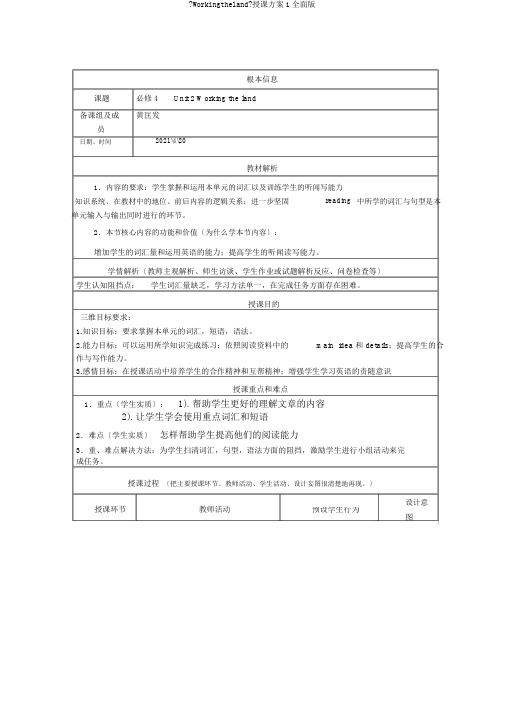
根本信息课题必修 4Unit 2 Working the land备课组及成黄匡发员日期、时间2021\4\20教材解析1.内容的要求:学生掌握和运用本单元的词汇以及训练学生的听闻写能力知识系统、在教材中的地位、前后内容的逻辑关系:进一步坚固reading中所学的词汇与句型是本单元输入与输出同时进行的环节。
2.本节核心内容的功能和价值〔为什么学本节内容〕:增加学生的词汇量和运用英语的能力;提高学生的听闻读写能力。
学情解析〔教师主观解析、师生访谈、学生作业或试题解析反应、问卷检查等〕学生认知阻挡点:学生词汇量缺乏,学习方法单一,在完成任务方面存在困难。
授课目的三维目标要求:1.知识目标:要求掌握本单元的词汇,短语,语法。
2.能力目标:可以运用所学知识完成练习;依照阅读资料中的main idea 和 details;提高学生的合作与写作能力。
3.感情目标:在授课活动中培养学生的合作精神和互帮精神;增强学生学习英语的责随意识授课重点和难点1.重点〔学生实质〕:1). 帮助学生更好的理解文章的内容2). 让学生学会使用重点词汇和短语2.难点〔学生实质〕怎样帮助学生提高他们的阅读能力3.重、难点解决方法:为学生扫清词汇,句型,语法方面的阻挡,激励学生进行小组活动来完成任务。
授课过程〔把主要授课环节、教师活动、学生活动、设计妄图很清楚地再现。
〕授课环节教师活动设计意预设学生行为图Step1. Warming up1.Ask the students whether theyhave grown any plants.if so,whatdid they do to grow them.Step2. Pre-readingTast 1 :some facts 引出课文,提高学生口语表达能力Show some pictures of hungryAfricans and some international factson hunger and poverty .1)Every 8 seconds, a childsomewhere in the world dies fromstarvation,2)More than 800 million people inthe world suffer from hunger andmany of them are fromdeveloping countries.Suggeested answers:1)We can donate some money andfood.2)We can send some children torich countries.3)The government can give themsome food for free.Tast 2 : show a picture ( Yuanlongping)Questions:1)Who is in the picture ?Period one 2)Have you heard of him ?If so , Read tell me something about him.Step3. ReadingTast 1 :prediction 1.学生说出自己种植的一两种植物,描述怎样种植,何时收获等。
Unit2Workingtheland教案(新人教必修4).doc
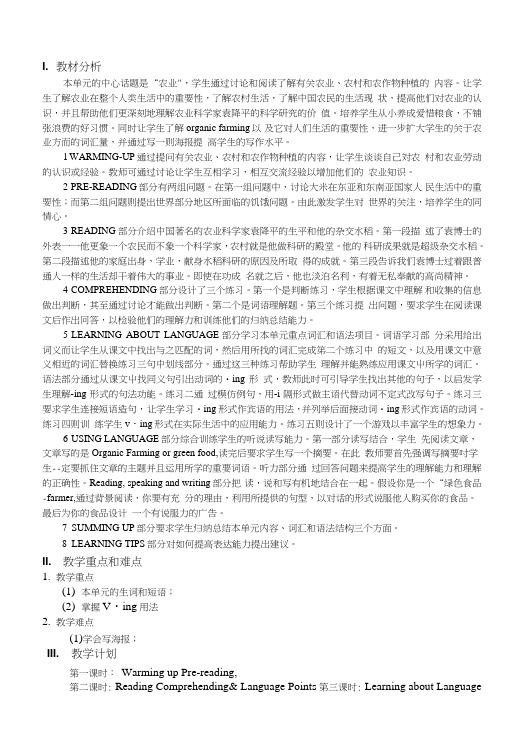
I. 教材分析本单元的中心话题是“农业",学生通过讨论和阅读了解有关农业、农村和农作物种植的内容。
让学生了解农业在整个人类生活中的重要性,了解农村生活,了解中国农民的生活现状,提高他们对农业的认识,并且帮助他们更深刻地理解农业科学家袁降平的科学研究的价值。
培养学生从小养成爱惜粮食,不铺张浪费的好习惯。
同时让学生了解organic farming以及它对人们生活的重要性,进一步扩大学生的关于农业方而的词汇量,并通过写一则海报提高学生的写作水平。
1WARMING-UP通过提问有关农业、农村和农作物种植的内容,让学生谈谈自己対农村和农业劳动的认识或经验。
教师可通过讨论让学生互相学习,相互交流经验以增加他们的农业知识。
2PRE-READING部分有两组问题。
在第一组问题中,讨论大米在东亚和东南亚国家人民生活中的重要性;而第二组问题则提出世界部分地区所面临的饥饿问题。
由此激发学生对世界的关注,培养学生的同情心。
3READING部分介绍中国著名的农业科学家袁降平的生平和他的杂交水稻。
第一段描述了袁博士的外表一一他更象一个农民而不象一个科学家,农村就是他做科研的殿堂。
他的科研成果就是超级杂交水稻。
第二段描述他的家庭出身,学业,献身水稻科研的原因及所取得的成就。
第三段告诉我们袁博士过着跟普通人一样的生活却干着伟大的事业。
即使在功成名就之后,他也淡泊名利,有着无私奉献的高尚精神。
4COMPREHENDING部分设计了三个练习。
第一个是判断练习,学生根据课文中理解和收集的信息做出判断,其至通过讨论才能做出判断。
第二个是词语理解题。
第三个练习提出问题,要求学生在阅读课文后作出冋答,以检验他们的理解力和训练他们的归纳总结能力。
5LEARNING ABOUT LANGUAGE部分学习本单元重点词汇和语法项目。
词语学习部分采用给出词义而让学生从课文中找出与之匹配的词,然后用所找的词汇完成笫二个练习中的短文,以及用课文中意义相近的词汇替换练习三句中划线部分。
重庆高中英语必修四 Unit2《Working the land》全套教案
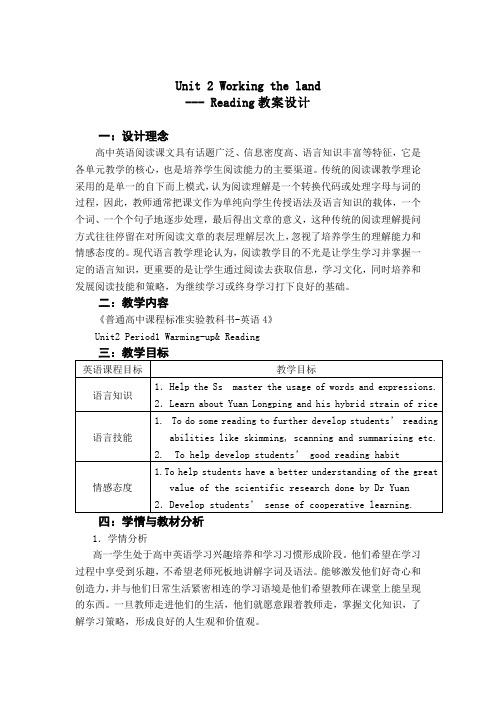
Unit 2 Working the land--- Reading教案设计一:设计理念高中英语阅读课文具有话题广泛、信息密度高、语言知识丰富等特征,它是各单元教学的核心,也是培养学生阅读能力的主要渠道。
传统的阅读课教学理论采用的是单一的自下而上模式,认为阅读理解是一个转换代码或处理字母与词的过程,因此,教师通常把课文作为单纯向学生传授语法及语言知识的载体,一个个词、一个个句子地逐步处理,最后得出文章的意义,这种传统的阅读理解提问方式往往停留在对所阅读文章的表层理解层次上,忽视了培养学生的理解能力和情感态度的。
现代语言教学理论认为,阅读教学目的不光是让学生学习并掌握一定的语言知识,更重要的是让学生通过阅读去获取信息,学习文化,同时培养和发展阅读技能和策略,为继续学习或终身学习打下良好的基础。
二:教学内容《普通高中课程标准实验教科书-英语4》Unit2 Period1 Warming-up& Reading四:学情与教材分析1.学情分析高一学生处于高中英语学习兴趣培养和学习习惯形成阶段。
他们希望在学习过程中享受到乐趣,不希望老师死板地讲解字词及语法。
能够激发他们好奇心和创造力,并与他们日常生活紧密相连的学习语境是他们希望教师在课堂上能呈现的东西。
一旦教师走进他们的生活,他们就愿意跟着教师走,掌握文化知识,了解学习策略,形成良好的人生观和价值观。
2.教材分析本单元的中心话题是“农业”学生通过讨论和阅读了解有关农业个农作物的种植的内容,了解了农业对人类生活的重要性。
阅读教学取材“水稻之父”---袁隆平,话题有趣,材料真实,学生们头脑中已经储存了大量的信息和对人物的全面、深度的认识,教学内容能引起学生很大的探究和讨论的兴趣。
3.教学重点、难点:Teaching Important PointsHelp the students to understand the passage better.Learn and master the important words and phrases in this period.How to help the students make up their minds to make contributions to the society in the future like Dr Yuan.Teaching Difficult PointsHow to help the students improve their reading ability and understand the passage better.How to master the important language points in this passage.五:教学准备1. a computer2. a blackboard六:教学过程Step1:Warming-upTask 1: Leading inAsk Ss some questions.T: Have you ever been to the countryside?S: Yes.T: Do you want to go to the farm?S: Yes.T: You are very nice! Now ,let us go to the farm together .How many students have a QQ farm? Please put up your hands. Can you play now?S: Yes, it’s ver y easy!First,we need go to the shop to buy some seeds. Second, we should plough and turn over the soil so that we can have a good harvest .We should remove the weeds, fertilize and water the crops…设计说明:教师先以直观图片和游戏的形式创设话题情景,激活学生头脑中的相关图式,通过师生互动,巧妙地将学生的思维引导到课文主题上来,借助层层递进的话题引导,使学生逐渐进入更深层得学习境界。
[高中英语]人教版高中英语必修四《Unit 2 Working the land》教案(2)
![[高中英语]人教版高中英语必修四《Unit 2 Working the land》教案(2)](https://img.taocdn.com/s3/m/104786a3aeaad1f346933fe7.png)
Period 2 GrammarTeaching goals 教学目标1. Enable Ss to master the usage of the words and expressions above and use the -ing form as subject and object correctly and freely.2. Help Ss learn how to use these words and expressions freely to express their ideas and use the -ing form as subject and object as they like. They can also practise actively and attentively so that they reach their goals.Teaching important points 教学重点The usage of the important words and the -ing form used as subject and object. Teaching difficult points 教学难点How to use the words and expressions and the -ing form freely.Teaching procedures & ways 教学过程与方式StepⅠ动名词做主语的用法1. 动词-ing形式作主语表示抽象的或泛指的动作, 谓语动词用单数.如:Reading aloud is very important for us to learn a foreign language.Going to bed early and getting up early is considered to be a good habit.2. 动词-ing形式作主语时常后置, 用it作形式主语,用形容词或名词作表语.常见的作表语的名词或短语有:no use, no good, fun, hard work, a hard / difficult job,a wonder, a waste of time等.如:Is it worthwhile quarrelling with her? It’s no good waiting here. Let’s go home. It was a waste of time reading that book.3. “There is + no”后可以用动词-ing形式作主语,表示“没法……”.如:There was no telling when this might happen again.没法预料这样的事什么时候会再发生.There was no knowing what he could do. 他能做什么很难说.StepⅡ动词-ing形式作宾语1. 有些动词如admit, avoid, consider, escape, deny, risk, suggest等后能接动词-ing 形式作宾语,而不能接动词不定式.如:We’re considering paying a visit to the Science Museum.2. 有些短语如can’t help, be used to, end up, feel like, lead to, be busy, be tired of,be fond of, be afraid of, be proud of, think of / about, put off, keep on, insist on, be good at, give up等后常接名词、代词或动词-ing形式作宾语.如:I have been used to living here.I’m fond of collecting stamps and coins.3. need, require, want作“需要”解时, 后接动词-ing形式作宾语, 主动形式表示被动意义, 相当于to be done.如:The radio needs / requires / wants repairing / to be repaired.[注意]1. 动词-ing形式的复合结构是指在动词-ing形式前面加上逻辑主语来强调动作的执行者,该逻辑主语常为形容词性物主代词或名词所有格;当逻辑主语不出现在句首时,可用人称代词的宾格代替形容词性物主代词或用名词普通格代替名词的所有格.如:I’m annoyed about John’s forgetting to pay.I really can’t understand you treating her like that.2. 动词-ing形式的否定形式是在其前面加not,带有逻辑主语时not应在动词-ing形式之前.如:Not cleaning his teeth made him smell bad.Your schoolmate’s not coming home in time made her parents worried.以下的动词后面加动词的不定式作宾语:decide, hope, expect, seem, agree, afford, arrange, choose, offer, plan, promise, determine, demand, manage, fail, prepare, refuse, pretend以下的动词后面既可接动词的不定式又可以接动词的ing作宾语:hate, love, prefer, remember, forget, regret, like, try, stop, begin, startStep Ⅲ Exercises。
人教版高中英语必修四《Unit 2 Working the land》教案(3)

Period 3 Using LanguageTeaching goals 教学目标1. Enable Ss to master the main idea of the text and know the ways of organizing articles.2. Help Ss learn how to enlarge the words and structures of the same topic. Teaching important and difficult points 教学重难点1. How to grasp the main idea of the passage.2. How to grasp the words and phrases and be able to use them freely.Teaching procedures & ways 教学过程与方法StepⅠLook at the pictures.What is the substance we put on the soil which makes crops grow?How many kinds of fertilizers do farmers use?Which kind do farmers use when they are doing organic farming?Do you know about organic farming?StepⅡReading1. Scan the passage and get the main idea.Chemical fertilizers can cause many problems, so organic farming is becoming more popular.2. Answer the following questions after read the passage.1. Why are chemical fertilizers so popular in farming today?2. What problems can be caused by using chemical fertilizers?3. What is organic farming?4. What is the main reason for using organic farming methods?Keys: 1. They are a great way to stop crop disease and increase production.2. They can damage the land by killing helpful bacteria and pests and bystaying in the ground and underground water for a long time. Theydamage people’s health by building up in their bodies and leading tocancer or other illnesses.3. Organic farming means growing crops without using any chemicals.4. The main reason for using organic farming methods is to grow good foodand to avoid damaging the environment or people’s health.3. Read the passage carefully and fill in the blanks.Step ⅢProjectPersuade farmers to grow the crops by organic farming with the knowledge learnt.What is organic farming?What fertilizer should they use? Why?How to plant the different crops?...Step ⅣLanguage pointsStep ⅤListening1. What is the main topic of the conversation?The possible bad effects of chemical fertilizers on the fruit and vegetables that we eat today.2. Listen to the dialogue a second time. Decide if the following statement are true or false.1. Paul thinks that Carrie is not telling him the truth.2. Using chemical fertilizers always makes vegetables empty inside.3. Today’s fruit is not as healthy for people as fruit fifty years ago.4. Eating more vegetables might not always be good for us.5. All of today’s vegetables look healthy but in fact are not.Keys: T, F, T, F, TStep ⅥHomeworkWrite a summary of this passage following the procedure.Step 1: Skim the passage to find its main idea. Write it down in your own words.Step 2: Find and underline the topic sentence of each paragraph. Rewrite each topic sentence, using your own words. Do not copy from the passage!Step 3: Write your summary. First sate the main idea of the passage and then the topics covered by each paragraph. Remember, use your own words!。
教学设计-高中高二英语人教版(新课标)必修四Unit 2 Working the land
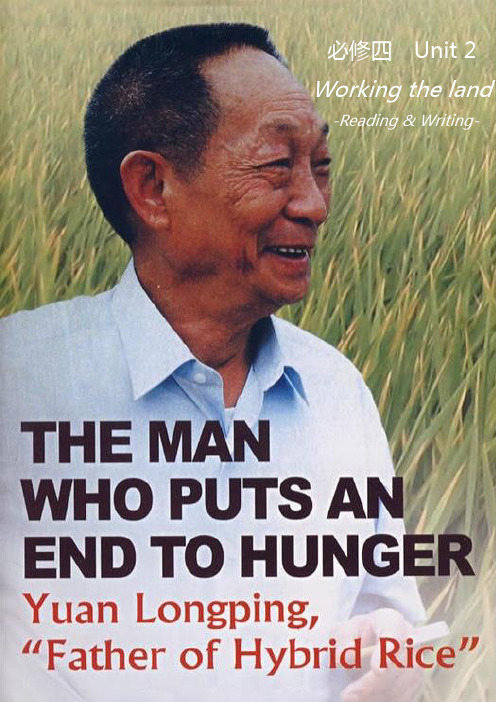
目录一、教学理念 (1)二、设计思路 (1)三、教材分析 (2)四、学情分析 (2)五、教学目标 (3)(一)语言知识 (3)(二)学习能力 (3)(三)情感态度 (3)六、教学重难点 (3)(一)教学重点 (3)(二)教学难点 (3)七、教学方法 (3)八、教学环节 (4)Step 1: Lead in (4)Step 2: Reading (5)Step 3: Discussion and Presentation (6)Step 4: Micro-writing: summary (7)Step 5: Homework (9)九、板书设计 (9)十、预设反思 (9)一、教学理念为了落实“立德树人”的根本任务,发展素质教育,教育部制定并颁布了《普通高中英语课程标准(2017年版)》(以下简称《课标》)。
《课标》指出普通高中英语课程具有重要的育人功能,把英语学科的工具性和人文性统一起来,旨在发展学生的语言能力、文化意识、思维品质和学习能力等英语学科核心素养。
其中文化意识指对中外文化的理解和对优秀文化的认同,是学生在全球化背景下表现出的跨文化认知、态度和行为取向。
在落实方面,明确教师在发展学生英语语言能力的过程中,应帮助他们学习、理解和鉴赏中外优秀文化,培育中国情怀,坚定文化自信,拓宽国际视野,增进国际理解(教育部,2018)。
在英语学科教育的过程中,丰富学生的文化知识、增加学生的情感体验、端正学生的文化态度、形成学生正确的价值判断、内化学生的文化品格、优化学生的文化行为是培养学生文化意识的重要内容(章策文,2019)。
针对母语文化和目的语文化的相互关系和在教学中的侧重,梅德明教授(2018)提出,在外语学科教育中,国际视野和跨文化沟通能力应该以中国情怀和中华基因为根基。
外语教育必须培养学生的“中国情怀”“国际视野”“文化意识”“思维品质”“人文素养”和“沟通能力”,要求学生树立正确的历史观、国家观、民族观、文化观,理解中国特色社会主义文化,主动积极地与来自多元文化背景的人们共同构建人类命运共同体。
- 1、下载文档前请自行甄别文档内容的完整性,平台不提供额外的编辑、内容补充、找答案等附加服务。
- 2、"仅部分预览"的文档,不可在线预览部分如存在完整性等问题,可反馈申请退款(可完整预览的文档不适用该条件!)。
- 3、如文档侵犯您的权益,请联系客服反馈,我们会尽快为您处理(人工客服工作时间:9:00-18:30)。
五.Teaching Important Points(教学重点)
(1) Get students to listen and understand the listening material.
(2) Get students to learn how to persuade others by using the functional items for persuasion
六.Teaching Difficult Points(教学难点)
(1) Get students to learn to design a poster by advertising the safety and imporance of eating “green food”.
二、教材分析
本节课是人教新课标必修4 Unit2 Working the land(warming up reading)内容,学生在extensive reading部分已了解了“Chemical or Organic Farming?”的有关情况,为本节课的听说读写训练作了铺垫。虽然学生对chemical farming和organic farming有了一定的理解,但是要求他们把相关内容用英语表达出来仍有一定的难度。本节课的目的是让学生通过听、读活动,从语言材料中获取相关的信息,并通过对信息的加工和处理,提高他们的说、写能力。
七.Teaching Methods(教学方法)
1.Task-based method(任务型教学法)
2.Skimming(略读法)
3.Carefulreading(细读法)
八.Teaching Aids:(教学辅助手段)
1.A blackboard
2.A projectorAsk students to Listen to the tape for a second time. Decide if the following statesments are true or false. Before listening, ask students to go through the five sentences first.( If necessary, write down key words.)
设计意图:通过记者对农民的采访,激活学生已有的知识。然后,以chemical farming为切入点,给学生看实物,一个长得很大但又空心的大白菜,以引起学生对听力的兴趣,从而自然地引出听力材料的话题“What is wrong with the vegetable?”。
Step2: While- listening
1. Ask students to listen to the tape for the main idea.
---The possible bad effects of chemical fertilizers on the fruit and vegetables that we eat today
九.Teaching procedures (教学过程)
Step1. Revision & Lead—in before listening
1. Ask students to go over what they have learned in the extensive reading by doing an interwiew.
三、学情分析
我们学校的学生整体上英语普遍偏差,上课虽然认真,老师要求在课堂上完成的学习练习较难完成。因此在教学中我根据两个不同的班级情况准备采用分层授课和分层布置作业使每一位学生得到提高。
这节课的目的是提高学生的听说读写综合能力。以一根主线下来,从听力中chemical farming的缺点到说、读、写部分的green food的优点,从语言的输入到语言的输出。首先让学生从听力材料中获知“Chemical farming”对食物的影响,训练学生的听力能力,提出绿色食品,注重食物安全。然后从阅读材料中获知“green food”的生长环境和好处。接着提供情景,让学生编对话,运用useful expressions of persuation,训练学生的口语表达能力。最后,在写作中,提供sample和三个情景,叫学生设计海报,提高学生的写作能力。
四.Design of Teaching Objectives 教学目标设计
(1)Develop students’ listening, reading, speaking and writing ability.
(2)Let students learn some expressions of persuation.
“Working the land”教学设计
学科年级:高二年级英语
教材版本:人教新课标必修4
一、指导思想与理论依据
认真钻研新课标,树立新观念,探索新教法,以落实教学常规,规范教学行为为重点,以大兴教科研之风,走科教兴校之路为抓手,以改革课堂教学模式,推行先学后教当堂训练为突破口,在学校教学计划指导下进行工作。特别注重提高学生用英语进行思维和表达的能力。继续拓宽学生的知识面,全面培养听、说、读、写四会能力,理解、分析和阅读的能力,让学生尽快适应高中学习。
2. Teacher shows a cabbage with a hole in it to the class and ask:
Look! What is wrong with the vegetable?
预设学生行为:学生带着问题“What is wrong with the vegetable?”去听,这种设疑导入法能有效激发学生的兴趣,形成对学习内容知之、好之、乐之的心理过程,达到激趣乐学最佳状态。
